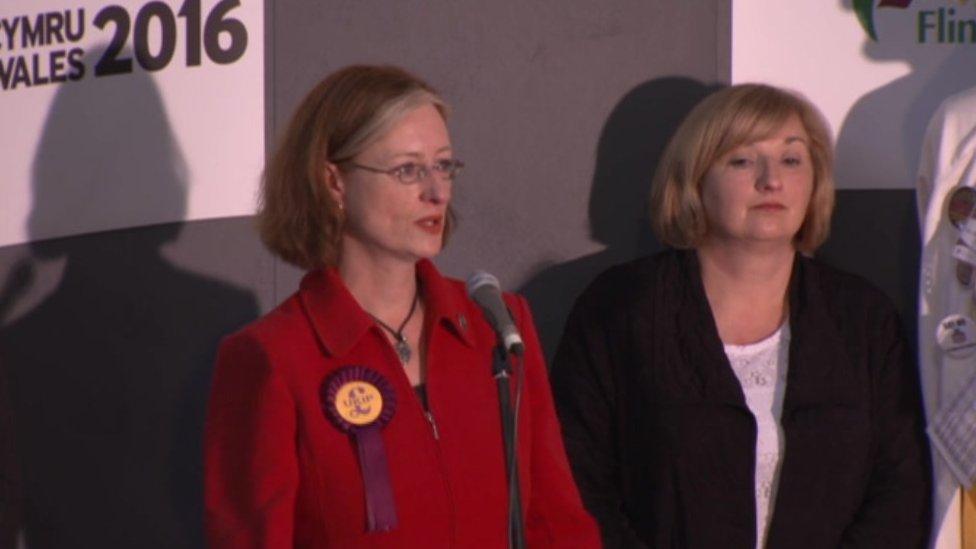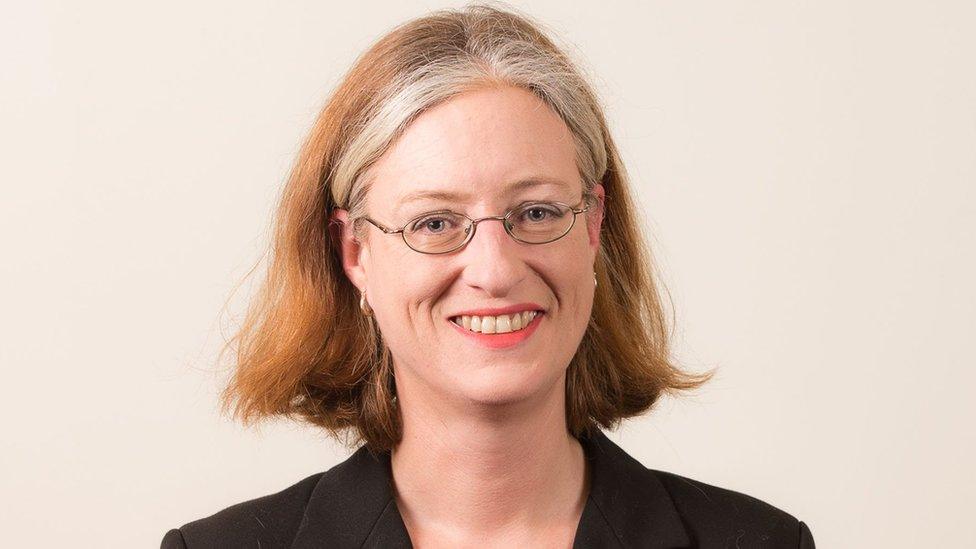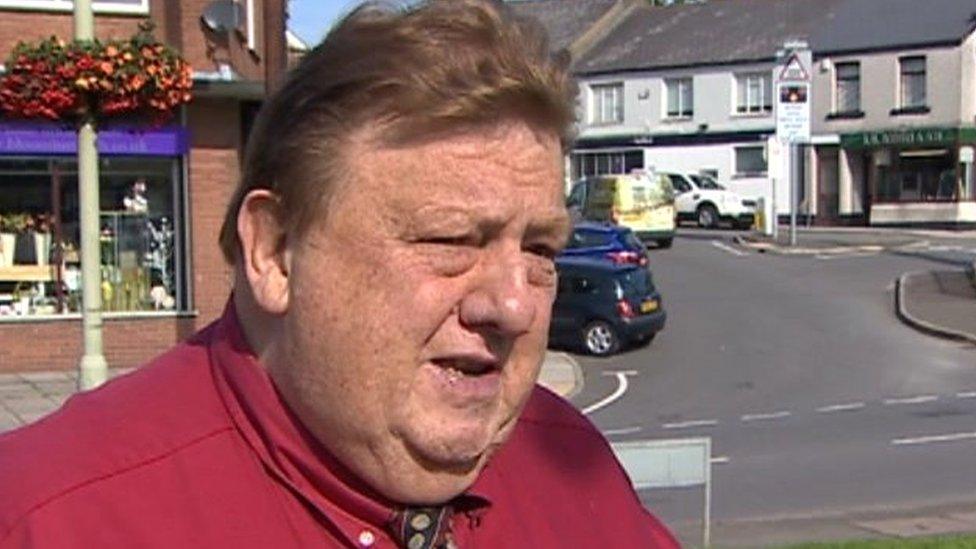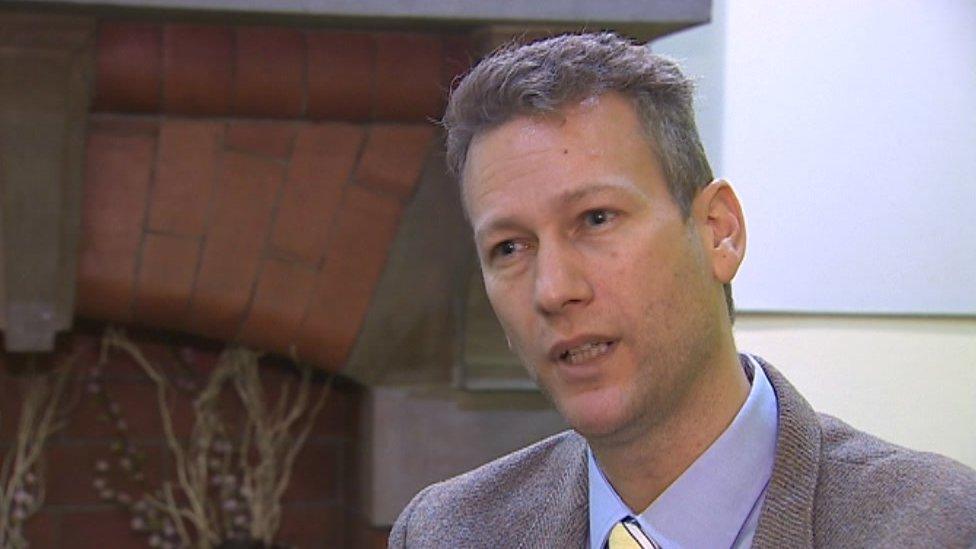UKIP AM Michelle Brown faces 'misconduct' confidence vote
- Published

Michelle Brown was elected to the assembly as a regional list member for North Wales in May 2016
UKIP AM Michelle Brown is to face a vote of no confidence among party members across north Wales.
Party activists met in Holywell, Flintshire, on Monday to discuss concerns about "serious misconduct".
In recent months, Ms Brown has denied a hotel's allegations of smoking recreational drugs, and of impropriety over changing the text of a job advert.
She declined an invitation to attend the meeting, and her spokesman described it as "petty infighting".
UKIP assembly leader Neil Hamilton said Ms Brown had his full support.
Members from six UKIP branches in north east Wales passed a vote of no confidence in Ms Brown but decided to hold a wider vote of members across north Wales in about a month's time.
UKIP activist Susan Williams says Michelle Brown is not engaging with the public
Shaun Owen, vice-chair of UKIP's Delyn branch, told BBC Wales that activists in north Wales felt "deserted" by Ms Brown and by the party in general.
"We've been very active over the past 18 months to two-year period in getting her elected to a position as the AM and also, of course, promoting the Leave campaign," he said, referring to the referendum vote for Brexit.
"A lot of people have put in a lot of effort, a lot of footwork, a lot of time and a lot of money into those campaigns as well, only to be rejected by Michelle Brown."
UKIP Delyn treasurer Susan Williams added the AM was not "engaging with the population" or properly representing them in the assembly.
UKIP assembly leader Neil Hamilton said the meeting had "no constitutional significance"
Neil Hamilton told BBC Wales the meeting was organised by people who were largely not members of UKIP. "This meeting has no constitutional significance at all," he said.
"It's a culmination of a long and bitter campaign, a personal campaign against her, and she has my full support."
BBC Wales has seen a copy of a letter from Mr Owen inviting Ms Brown to the meeting to discuss her "serious misconduct", saying there was a "deep sense of growing disquiet, disillusionment and alarm" amongst members.
The letter listed 18 concerns, including an accusation by a Cardiff hotel that the UKIP AM for north Wales smoked "recreational drugs" in her bedroom.
Ms Brown's spokesman has denied the allegation, saying the "strong smell" in her room was caused by a strong tobacco product.
Lifting the lid on redacted exchange between AM and assembly official
Details of discussions between Ms Brown and an assembly official concerning how an advert for a job in her office could be changed to help her brother get an interview for the post are also included in the letter.
Ms Brown has said she acted with "complete propriety" in the matter.
Mr Owen's letter also cited a property leased by the North Wales AM to serve as her regional office which has never been opened.
Responding to a Freedom of Information request by BBC Wales, the Welsh Assembly said it had paid £2,027.93 for the property between October 2016 and March 2017.
The assembly said the office in Shotton, Flintshire, was not occupied "because work necessary to ensure its security was carried out incorrectly".
Responding to the letter, a spokesman for Ms Brown said: "This letter represents nothing more than some petty infighting that is a relic from the pre-Nuttall era."
UKIP won seven seats in the 2016 Welsh Assembly elections but, after a row, fellow north Wales AM and former UKIP Wales leader Nathan Gill left the assembly group to sit as an independent.

Analysis by Nick Servini, BBC Wales political editor
With all the questions marks surrounding the role of UKIP now that the process of leaving the European Union has begun, more background noise like this will not be helpful.
The UKIP group at the assembly has become hugely important for the party in showing that it can develop a democratically-elected power base.
But since the assembly election last year, UKIP's story has largely been one of infighting at the Senedd with Nathan Gill becoming an independent after a row with Neil Hamilton.
UKIP always insisted it would bring something different to assembly politics.
New developments like this surrounding Michelle Brown will make it more difficult for UKIP supporters to persuade people its impact has been positive.
- Published1 February 2017

- Published16 February 2017

- Published9 March 2017

- Published17 August 2016
